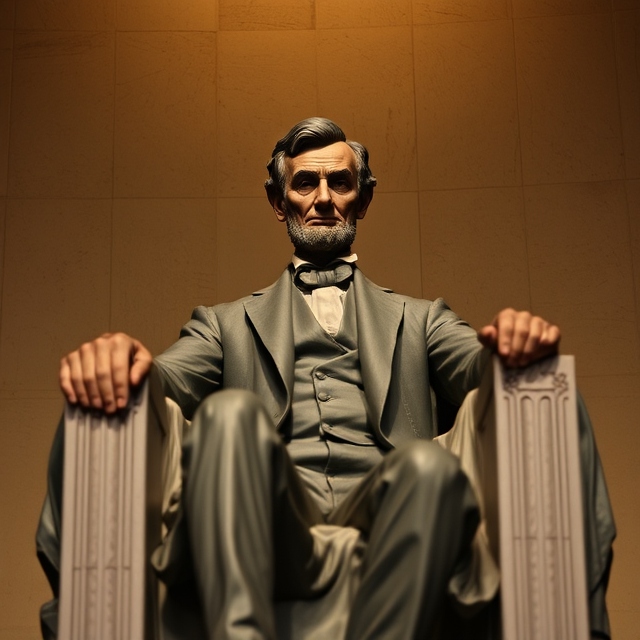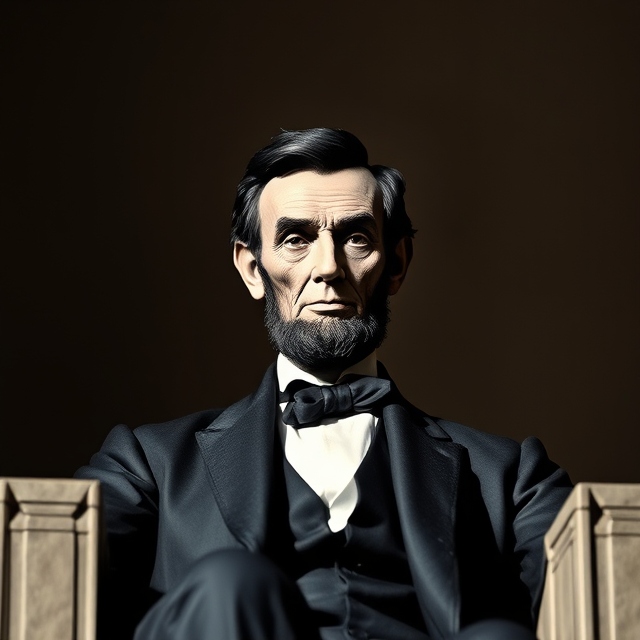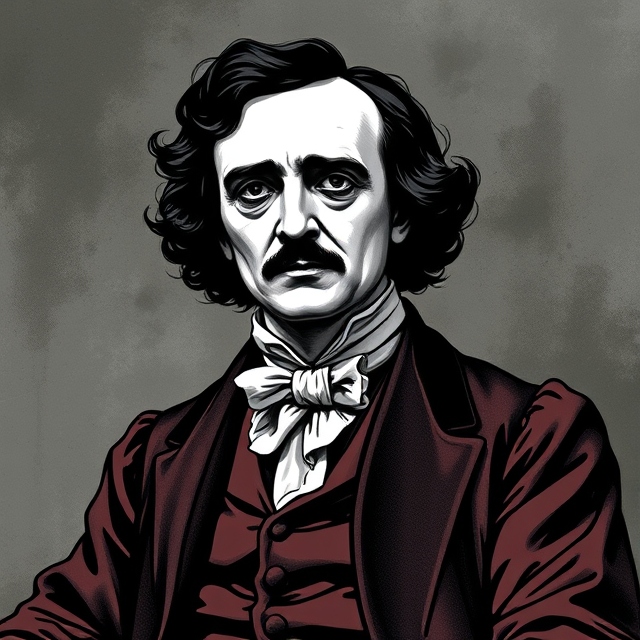
Abraham Lincoln Biography
The life of Abraham Lincoln was a quintessential story of hardship, tenacity, and perseverance that would eventually shape him into one of the most honored figures in American history. From a lowly beginning till he became the President of the United States in its most trying times, Lincoln’s story would tell much about lessons learned under perseverance, courage, and unwavering commitment to justice. Let us now look, using the framework of PAS-theory, how life experiences would shape the journey of Lincoln: the life story of one man whose influence changed America forever.
Abraham Lincoln : Humble Beginning and Unrelenting Struggles
Abraham Lincoln was born on February 12, 1809, in a one-room log cabin in Hardin County, Kentucky, under very humble conditions. His parents were hardworking farmers and ill-equipped for much of life’s conveniences; they barely managed to get through the toughest of times. Indeed, Lincoln spent most of his childhood working on the family farm. The family itself was by no means well-off; the money available was hardly sufficient to make ends meet. Lincoln was given less than one year of formal education. He was naturally inclined to studying, however. He had most of his education through self-study. Most of his education was in the form of reading books that other people borrowed for him and learning from other people.

Losing a mother, one of the darker moments in a young man’s life, had already befallen Lincoln at nine years old when his mother Nancy died from milk sickness. After Lincoln’s first wife’s death, his father remarried and took yet another mother figure into his home for his young boy to love. Life, however was harsh. He was said to have shifted several times during Lincoln’s childhood days with the idea of a better place. This kind of lifestyle made Lincoln never have a fixed ground, nor an even decent facility for studies and thus was required to put in extra efforts to sustain his family.
A childhood life of hard work and no big savings account and no education, neither formal nor information, was Lincoln’s. But the man did not use such blocks as his limits but rather fueled up for something big. He dreamt of a better life for him and for his country. Between him and his achievement stood, however, a myriad of obstacles, and a road paved with smooth stones was definitely not leading him to being a leader.
Abraham Lincoln : The Road to Lincoln’s Obstacles, Failures, and Resilience
He was ambitious enough to leave his family and venture alone in life. He was a store clerk, surveyor, and postmaster at some time in New Salem, Illinois. In fact, he had begun to come into prominence at this time when he entered the militia of Illinois in the Black Hawk War. Though he did not have an action-filled term, his short term was enough to make him known for honesty and reliability.

Lincoln had started reading law by himself in New Salem. He borrowed books and thereafter went through them late into the night after long hours at work. His long efforts finally paid off as he came out with his license to practice law in 1836. In his late 1830s, Lincoln moved to Springfield, Illinois, where he was able to establish a very good law practice for himself and people started recognizing him as an honest practitioner with great litigating skills. It was because of this that he later won the nickname “Honest Abe.”
He then turned into a Whig in 1834 and acquired a seat in the Illinois State Legislature. He continued to serve for several terms, later just for a term for the U.S. House of Representatives. Yet political life would not go well without any obstacles. Spent sometime in Congress, he had to face a couple of political reversals. His re-election bid failed for the U.S. This never became the mainstream belief in America even after his election to the Senate in 1854 and again in 1858 despite a remarkable series of debates with his opponent Stephen A. Douglas. Slavery was really very deep-rooted in the economy and society of America during his times; the views he presented in public on human rights and equality, therefore, were radical enough to be viewed as dangerous by many in the society. He believed slavery to be morally wrong,
but he did not see any practical solution towards putting an end to it completely at least in the initial stages. However, as the war between the North and the South grew in intensity, Lincoln’s idea of preserving the Union and getting people their rights evolved to the very foundation of his campaign.
He was nominated for president in 1860 as the Republican candidate and became the president of the United States by winning the election for the presidency. His election, however was opposed by several Southern states who feared that their way of life would come under threat with his being an anti-slavery stalwart. Even before he could take office, seven Southern states seceded from the Union, in what would set the nation on a course for the bloody Civil War-a defining moment of Lincoln’s presidency and indeed one of the most historic events in American history.

Abraham Lincoln : Leadership and Biography of Lincoln
The Civil War marks the defining characteristic of Lincoln’s presidency and the immeasurable ordeals he endured. He entered the office in 1861 to find a nation torn asunder in deep passion, on the precipice of violence and revolt. His was the heavy burden of keeping the Union intact while wrestling with the shadow that had torn the country asunder-the issue of slavery.
Initially, Lincoln seemed to be concerned about preserving the Union, but somehow in the middle of the war, he realized that it was not just the right thing morally but also the correct thing to do to demoralize the Confederacy. Emancipation Proclamation In 1863, Lincoln issued the Emancipation Proclamation as declared by the president that all the slaves throughout the Confederate states were to be freed. This act basically turned the very face of war into a fight for human rights as well as national integration.
Emancipation Proclamation was the landmark of his era but just one step towards the greater vision of Lincoln for his United States; he believed in a country where every one, irrespective of their colour, can enjoy freedom and opportunities promised by America. This was a brutal war that registered massive losses on both sides. Lincoln personally witnessed the deaths as he spent days canvassing battlefields and hospitals, meeting with soldiers, and listening to their stories up close, among the atrocities of what this war could unleash.
After two years of this war, in 1864, while it was still raging, Lincoln ran again for a second term and won. Lincoln’s leadership represented the trust the American people had on him. Though the war had created a wide and gaping hole in this nation, almost everybody shared his dream of a united and free nation. On April 9, 1865, the Confederacy surrendered and that marked the end of the Civil War. It was a day of triumph, almost of relief after years of relentless struggle and unflinching conviction for what Lincoln believed in.
Unfortunately, the united and restored America that Lincoln had dreamed of and worked towards would soon be over. Just five days into the surrender of the Confederates, Lincoln was assassinated by John Wilkes Booth while he was at Ford’s Theatre, attending a play. This came in a time when he would take the nation into an era his leadership and commitment would take ever in any fashion possible. Though he could not live to see the full impact of his efforts, the leadership of Lincoln during the Civil War forever changed the nation.

Abraham Lincoln’s Influence and Lasting Legacy
- A Voice for Equality and Justice Lifed was committed to equality and justice principles. Those principles underwrote political life and defined the presidency; policies antislavery set the course for civil rights advances throughout the following decades.
- United Nation: Lincoln was able to protect the Union in one of its most turbulent times, which proved a testament to great power and determination to continue by a leader such as Lincoln. His leadership made sure that America was preserved, and at the end was once again united.
These circumstances elevated him to the champion of the common man: Lincoln’s humble life-from-logcabin-to-the-White-House inspirational aspect captured the imagination of millions that if one person is good enough, with hard work, he will offer himself to greatness with resilience and commitment to doing the right thing.
Legacy to Future Generations Lincoln’s speeches and writings, especially his Gettysburg Address and the second inaugural address, remain a source of inspiration for people in general and everywhere in the world. His vision of a just and united America finds its largest supporters among human rights and equal rights advocates.
- Legacy of Leadership: Lincoln’s leadership in the Civil War, and indeed his last four years in public life, set a standard that has been only partially matched by subsequent American presidents. His empathy, resolution, and even courageous response when adversity was thrust to the forefront still personify a model of true leadership.
Conclusion
Abraham Lincoln lived a life that would fill many volumes with stories of remarkable resilience and steadfast dedication to a vision of equality, justice, and unity. Being born into extreme poverty was no barrier to his education development as he ascended to the very top of America’s power apparatus. Every hurdle that he crossed would test him again, giving him a legacy to be one of America’s most beloved presidents. The leadership he provided during the Civil War, combined with his resolve to see slavery end, helped bring a hope to the end of what otherwise was a rather bleak period of American history.
This living legacy Lincoln left behind will go on and on in monuments and memorials erected in his name. His ideals inspire today as symbols of what he stood for. His life story is a reminder of what one individual can do for others through courage, perseverance, and a sense of justice that refuses to bend to hardship and adversity. Yet, in looking back over his life, we cannot but be drawn into the public memory of the profile of leadership with vision and integrity, which a leader can have on a nation.
Lincoln rose from a one-room cabin in Kentucky to the White House; there is little better by way of reminding us that greatness may come from humble beginnings. His life inspires testimony to the truth that dedication to a greater cause can get even the most striking obstacles overcome.





